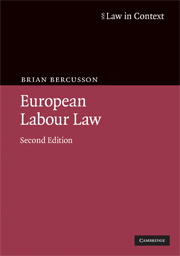Book contents
- Frontmatter
- Contents
- Preface
- Section I Labour law and Europe
- 1 European labour law and the social dimension of the European Union
- 2 EU labour law and the UK
- 3 The conceptualisation of European labour law
- 4 Shifting strategies 1951–1986: ECSC, EEC, harmonisation, financial instruments, qualified majority voting
- 5 The strategy of European social dialogue
- 6 The European Employment Strategy, the open method of coordination and the ‘Lisbon Strategy’
- 7 The strategy of fundamental rights: the EU Charter of Nice 2000 and a ‘constitutional’ strategy
- Section II The structure of European labour law
- Section III The futures of European labour law
- Index
- References
5 - The strategy of European social dialogue
from Section I - Labour law and Europe
Published online by Cambridge University Press: 05 June 2012
- Frontmatter
- Contents
- Preface
- Section I Labour law and Europe
- 1 European labour law and the social dimension of the European Union
- 2 EU labour law and the UK
- 3 The conceptualisation of European labour law
- 4 Shifting strategies 1951–1986: ECSC, EEC, harmonisation, financial instruments, qualified majority voting
- 5 The strategy of European social dialogue
- 6 The European Employment Strategy, the open method of coordination and the ‘Lisbon Strategy’
- 7 The strategy of fundamental rights: the EU Charter of Nice 2000 and a ‘constitutional’ strategy
- Section II The structure of European labour law
- Section III The futures of European labour law
- Index
- References
Summary
Introduction
The UK government's stance from 1979 in preventing the adoption at Community level of legislation on labour policy was dictated by its domestic policy. This stance coupled similar ‘deregulation’ at domestic level with an equally wholesale policy of exclusion of trade unions and weakening wherever possible of collective bargaining.
It is, therefore, ironic that it was this UK blockage of EC labour legislation which provided the critical impetus to a transformation in legal strategy for social policy and labour law at EU level: the emergence of dialogue between the social partners at European level. The doubtless unintended consequence of the UK government policy of decollectivisation of industrial relations at domestic level was the huge advance in collectivisation of industrial relations at EU level.
Since the ECSC, there had been a long-standing range of formal machinery incorporating representatives of the trade union movements and employer organisations in EC policy-making. The explanation for their involvement is part of a general theory which perceives the Community as not just a bilateral arrangement between Community institutions and Member States, but a complex polity which engages a wide range of other actors in social (and other) policy formation and implementation.
At a general level, the dependence of the Community on Member State cooperation in pursuing its policies means it is important to engage powerful national interest groups, such as trade union confederations and employers' organisations, in the policy process.
- Type
- Chapter
- Information
- European Labour Law , pp. 126 - 167Publisher: Cambridge University PressPrint publication year: 2009
References
- 1
- Cited by



